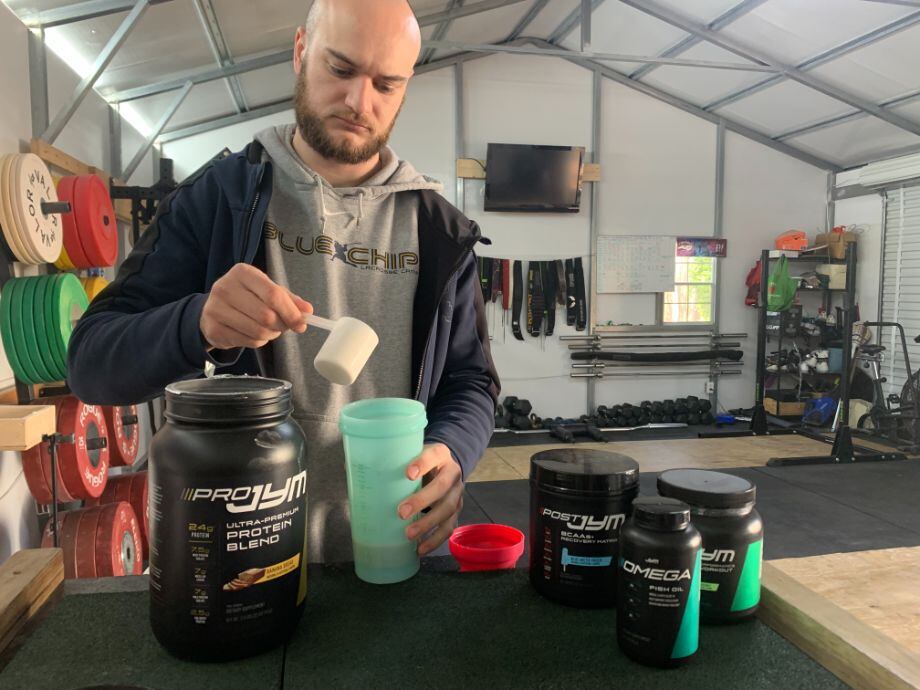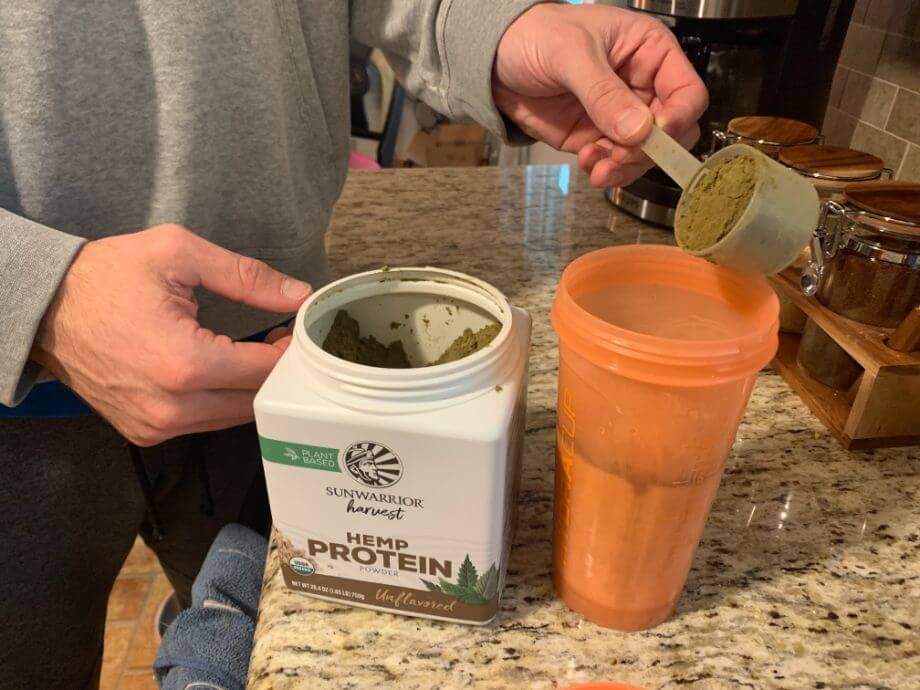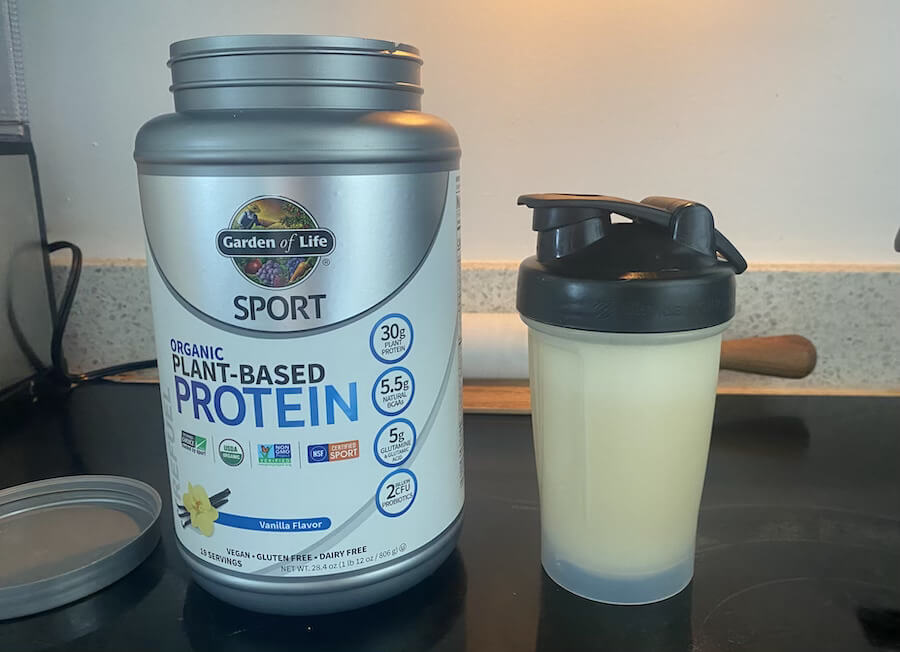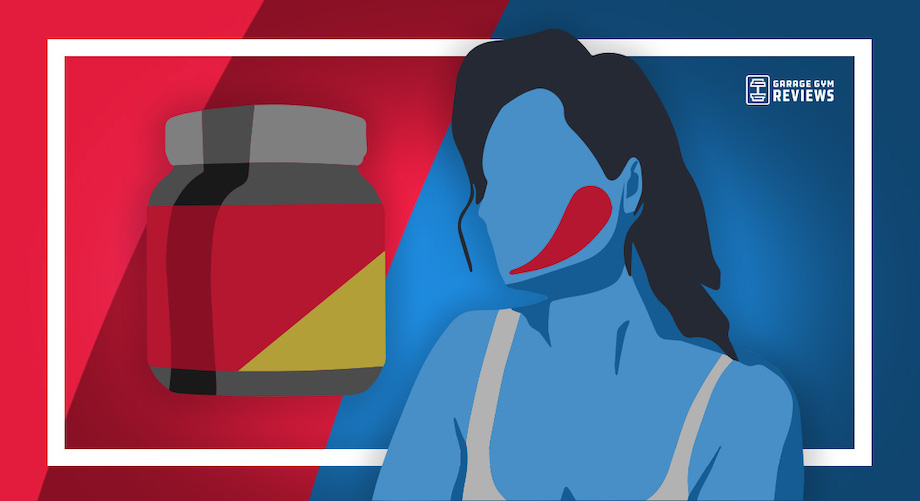We test and review fitness products based on an independent, multi-point methodology. If you use our links to purchase something, we may earn a commission. Read our disclosures.
Protein powder is a popular supplement used by many people to help build muscle and improve overall health. But does protein powder cause acne? The answer is not simple, as it depends on the individual and the type of protein powder they use.
Although the best protein powder does not directly cause acne, certain types of whey protein supplements that contain androgens and insulin-like growth factor 1 (IGF-1) could lead to increased oil production and contribute to the development of acne. Recent clinical studies and credible research have shed light on the possible link between protein and acne. One such study1 found that a high protein diet, particularly from dairy sources, may contribute to the development of acne in some individuals.

If you have a history of acne, allergies, or sensitive skin, you might be more prone to developing acne as a result of using protein powder. People who regularly consume extremely large amounts of protein, like professional bodybuilders, may also be at higher risk. Fortunately, there are other protein sources available that could help reduce protein-induced acne and promote healthier skin. For example, you can try bone broth protein, egg white protein, or plant-based protein sources like hemp protein, brown rice protein, and pea protein.
RELATED: Plant-Based Protein Powder Benefits
It’s important to note that some protein powder supplements, especially those high in B6, B12, and iodine, could disrupt hormone balance and exacerbate acne. Therefore, it’s crucial to choose the right type of supplement and be aware of any potential side effects. Although protein powder may not always cause acne, it’s essential to be cautious and choose the right supplement to ensure the best possible results for your skin.
In addition to these concerns, some people may experience gut problems as a result of taking protein powder supplements. These issues can be attributed to the high levels of amino acids present in the supplements. To address these issues, you may want to consider taking a probiotic supplement. Probiotics can help to balance the gut microbiome, which can in turn help to reduce inflammation and other issues that may contribute to acne.
When choosing the best probiotic supplement, look for one that contains a variety of different strains and species, as this will help to ensure that you’re getting the most benefits possible. As always, it’s a good idea to talk to your doctor before starting any new supplement regimen.
Medical disclaimer: This article is intended for educational and informational purposes only. It is not intended as a substitute for medical advice. For health advice, contact a licensed healthcare provider.
How Can Whey Protein Cause Acne?
Whey protein is the most commonly used protein supplement, and it is derived from cow’s milk. While the best whey protein itself may not cause acne, it could contain high levels of androgens, which are hormones that can stimulate oil production and contribute to acne development. Furthermore, whey protein may also increase insulin-like growth factor 1 (IGF-1), which is a hormone that can promote skin inflammation and acne formation2.

The relationship between protein powder and acne is complex, and the type of protein supplement, as well as individual factors such as skin sensitivity and hormonal balance, can impact the development of acne. While some types of protein supplements, such as whey protein and soy protein, may contribute to increased oil production and acne formation, alternative protein sources like bone broth, egg white, and plant-based proteins may be beneficial for reducing protein-induced acne breakouts.
Additionally, certain supplements, such as those high in B6, B12, and iodine, may also disrupt hormone balance and trigger acne breakouts. It’s important to speak with a healthcare provider before starting any new supplement regimen and to carefully read labels to avoid any problematic ingredients. By taking the necessary precautions and choosing the right type of protein powder supplement, individuals can minimize the risk of protein-induced acne and achieve clearer, healthier skin.
RELATED: Best Lactose-Free Protein Powder
Other Links Between Whey Protein Powder and Acne
If you’ve been struggling with acne, you may be considering changing your diet to help clear up your skin. While it’s well-known that cutting back on sugar and processed foods can help, you may be wondering if certain types of protein could also be contributing to your breakouts. As a nutritionist, I often get questions about the link between protein and acne, and it turns out there are several factors that could be at play. In this section, we’ll explore some other links between protein and acne breakouts that you may not have considered.
Soy and Acne
If you’re looking for a different kind of protein powder than whey, you might have heard of soy protein. But did you know that soy protein can also cause acne in some people? That’s because soy has something called “phytoestrogens,” which can copy the effects of estrogen and mess up your hormones. When your hormones are unbalanced, your skin might make too much oil and get all clogged up, which can lead to acne breakouts.
Soy protein is a common alternative to whey protein, but it may also contribute to acne breakouts in some individuals. Soy contains phytoestrogens, which can mimic the effects of estrogen in the body and disrupt hormone balance. High levels of estrogen can lead to increased oil production and clogged pores, which can lead to acne breakouts, according to a 2012 study3.
Product Contamination
Protein powder supplements are not regulated by the FDA, which means that some products may contain contaminants that can contribute to acne breakouts. For example, some protein powders may contain steroids or hormones, which can disrupt hormone balance and contribute to acne formation4.
Who Is Prone to a Protein Acne Breakout?
While protein powder is not a direct cause of acne, certain individuals may be acne-prone, more easily developing breakouts when using protein supplements. Those with a history of acne may be more sensitive to hormonal fluctuations, which can be triggered by certain types of protein supplements. Additionally, those with sensitive skin or a history of allergies may be more susceptible to developing acne breakouts in response to whey protein powder use.
Alternative Proteins to Try
Are you tired of dealing with acne breakouts caused by high whey protein or casein protein powder consumption? Maybe it’s time to try alternative protein sources. By switching up your protein sources and trying these alternatives, you may be able to reduce protein-induced acne breakouts and achieve clearer, healthier skin.
Bone Broth Protein
One option to consider is bone broth protein, which is derived from the bones and connective tissues of animals and is rich in collagen, amino acids, and minerals. Collagen is a vital protein that makes up our skin, and supplementing with it may improve skin health and reduce the appearance of acne caused by protein consumption. Since collagen is a key protein that makes up the skin, supplementing with collagen may also reduce the appearance of wrinkles and dryness.
RELATED: Best Collagen Supplements
Egg White Protein
Egg white protein is another popular choice that is low in fat and cholesterol, making it a great option for those looking to build muscle mass while avoiding protein-induced acne. Egg white protein is a complete protein source that is derived from, you guessed it, egg whites. It is rich in amino acids and contains little to no fat or cholesterol, making it a popular choice among those wondering how to build muscle mass while avoiding unwanted weight gain.
Plant-Based Protein
And if you’re looking for a plant-based, vegan protein powder option, hemp and pea protein are excellent sources of essential amino acids and minerals that make them an excellent choice for those looking to build muscle mass and support healthy skin. Pea protein, in particular, is high in lysine, which is important for collagen production in the skin.
RELATED: Best Vegan Protein Powder

Did you know that some studies5 have shown that pea protein may be just as effective as whey protein in promoting muscle growth? That’s great news for vegans or anyone looking for a plant-based alternative to animal protein. Plus, plant-based proteins are often more sustainable and environmentally friendly than animal-based proteins, making them a win-win for both your health and the planet.
Can Other Supplements Trigger Acne?
Your daily dietary supplement regimen may need a second look if you’re experiencing stubborn acne. While hormonal changes are a common cause of breakouts, it’s surprising to know that certain supplements may also trigger acne in some people. If you’re into the best supplements for muscle growth that contain high levels of B6, B12, and iodine, you may want to pay closer attention. These ingredients can disrupt hormone balance in the body, leading to the development of acne. We do want to emphasize that not everyone who takes these supplements will experience acne, but it’s worth examining your supplement regimen if you’re struggling with breakouts. Don’t worry, we’ll provide alternatives and helpful tips on how to get clear, healthy skin.
B6 and B12
Vitamin B6 and B12 are essential vitamins that play a key role in overall health and wellness. However, high doses of these vitamins may contribute to acne breakouts in some individuals. Both vitamins can stimulate oil production in the skin, which can lead to clogged pores and acne formation.
Iodine
Iodine is an important mineral that can be found in many foods like seafood, eggs, and dairy products. But watch out, because too much iodine can actually make your skin more oily and cause pimples to pop up. This is because iodine can help acne-causing bacteria grow on your skin, which is not good news for acne-prone people trying to prevent acne breakouts!
Certain Muscle-Building Supplements
While some supplements may improve athletic performance, they can also have negative effects on the skin. Some muscle-building supplements can contain hormones, such as DHEA, testosterone, or androstenedione, which can increase oil production and trigger acne breakouts. This is one reason why it’s important to look for dietary supplements that are third-party tested.
In addition, some pre-workout supplements contain high levels of caffeine, which can also trigger acne breakouts by increasing stress hormone levels and inflammation. Creatine, another popular muscle-building supplement, has also been linked to acne breakouts in some cases.
If you are concerned about acne breakouts from dietary supplements, it is important to speak with a healthcare provider before starting any new supplement regimen. Additionally, be sure to read labels carefully and avoid any products that contain hormones or other ingredients that could be problematic for your skin.
Does Protein Powder Cause Acne?: FAQs
Can protein powder cause skin spots?
High-protein diets can make your body produce more oil that can clog your pores. Even some protein powders with extra stuff in them, like sugar or fake sugar, can make your skin worse. If you’ve had skin issues in the past, it’s a good idea to talk to a skin doctor before trying high-protein diets or protein powders.
Is there a link between protein and acne?
Recent clinical studies and credible research have shed light on the possible link between protein and acne. One such study found that a high protein diet, particularly from dairy sources, may contribute to the development of acne in some individuals1. These findings suggest that protein intake and its sources may play a role in the development and management of acne, and further research is needed to fully understand this relationship.
How can you prevent acne from protein powder?
To prevent acne breakouts from protein powder, there are several steps you can take. Firstly, try switching to a plant-based protein powder, as it is less likely to contain hormones that could cause acne. Secondly, be sure to read labels carefully and avoid products with added hormones or other problematic ingredients to minimize your risk of acne. Finally, practicing good skincare habits, such as regular face washing and use of non-comedogenic products, can help to prevent clogging of the skin pores, which can cause acne. It is important to note that these recommendations are not medical advice, but rather general guidelines to minimize the risk of developing acne from protein powder.
Does whey protein powder cause acne?
Whey protein can cause acne in some individuals. A 2013 study conducted by the Brazilian Society of Dermatology6 (Anais Brasileiros de Dermatologia) found that acne vulgaris was exacerbated by frequent whey protein use in young adults due to an increase in IGF-1 hormone levels. The study also found that these results were likely to occur in young females and those with no prior history of acne.
References
- Dharmik, P., & Marfatia, Y. S. (2018). Role of Vitamins and Minerals in Acne Vulgaris: A Systematic Review. International Journal of Pharmaceutical Sciences and Research, 9(9), 3651-3658
- LaRosa CL, Quach KA, Koons K, et al. Consumption of dairy in teenagers with and without acne. J Am Acad Dermatol. 2016;75(2):318-322. doi: 10.1016/j.jaad.2016.04.030
- Silverberg NB. Whey protein precipitating moderate to severe acne flares in 5 teenaged athletes. Cutis. 2012;90(2):70-72.
- Halvorsen JA, Dalgard F, Thoresen M, et al. Diet and acne vulgaris: a randomized controlled trial. J Am Acad Dermatol. 2012;66(5):AB170.
- Nicolas Babault, Christos Païzis, Gaëlle Deley, Laetitia Guérin-Deremaux, Marie-Hélène Saniez, Catherine Lefranc-Millot & François A Allaert (2015) Pea proteins oral supplementation promotes muscle thickness gains during resistance training: a double-blind, randomized, Placebo-controlled clinical trial vs. Whey protein, Journal of the International Society of Sports Nutrition, 12:1, DOI: 10.1186/s12970-014-0064-5
- Pontes Tde C, Fernandes Filho GM, Trindade Ade S, Sobral Filho JF. Incidence of acne vulgaris in young adult users of protein-calorie supplements in the city of João Pessoa–PB. An Bras Dermatol. 2013 Nov-Dec;88(6):907-12. doi: 10.1590/abd1806-4841.20132024. PMID: 24474098; PMCID: PMC3900340.
- Podgórska A, Puścion-Jakubik A, Markiewicz-Żukowska R, Gromkowska-Kępka KJ, Socha K. Acne Vulgaris and Intake of Selected Dietary Nutrients-A Summary of Information. Healthcare (Basel). 2021 Jun 3;9(6):668. doi: 10.3390/healthcare9060668. PMID: 34205209; PMCID: PMC8226785.
Further reading

Our Bodytech Creatine Monohydrate review looks at this 100% pure creatine supplement and compares it to other popular options. Read more

What is protein isolate? Contrary to popular belief, they're not limited to whey protein isolates. GGR's nutrition experts reveal and explain the full details! Read more

We tried the fitness app created by Thor himself, Chris Hemsworth. See if this training program is right for you in our Centr review. Read more

Read our honest opinion on this popular fitness watch in this Garmin Forerunner 265 review. Read more

